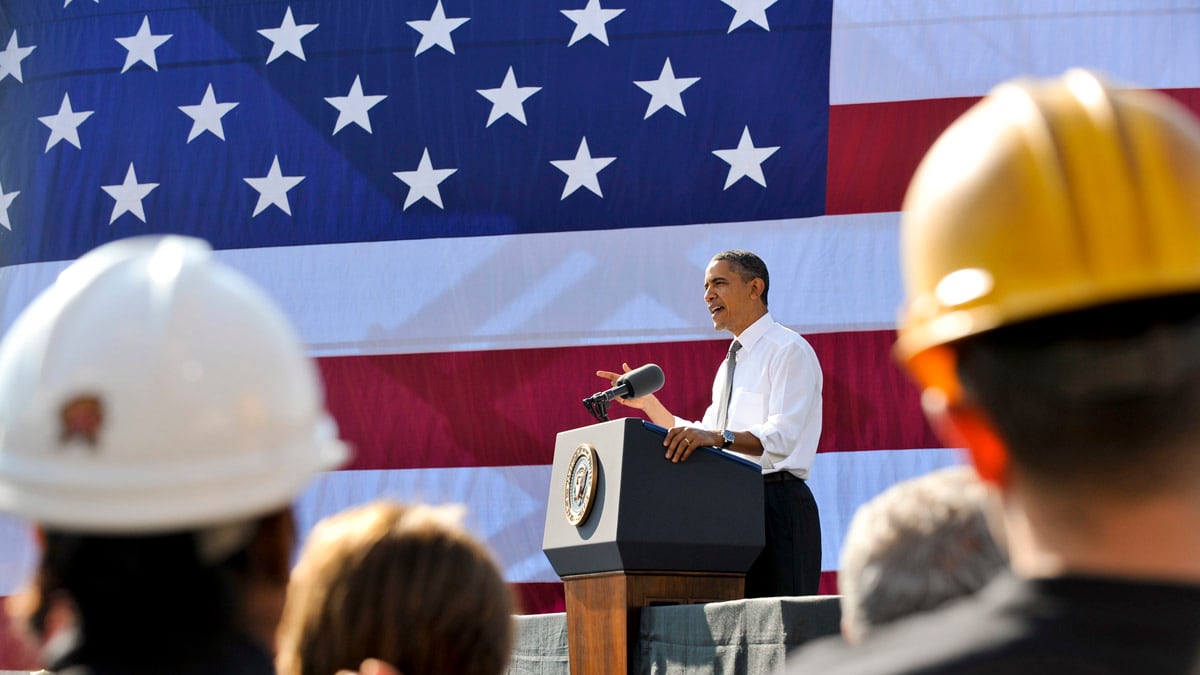President Obama likes to say the odds of his getting reelected are better than they were to get elected in the first place with the name Barack Hussein Obama.
“This time we’ve got to grind it out,” he says, warning supporters that “this election will not be as sexy as the first one.” Or as lopsided, as no one thinks Obama can pull off another Electoral College landslide. With unemployment at 9 percent and no relief in sight for millions of jobless Americans, Obama looked likely this summer to join the ranks of one-termers as voters got angrier and key states redder.
But that outlook has begun to change, thanks in part to Obama’s feistier tone in confronting the opposition, but also to a string of debates showcasing the Republican field for 2012, not always to the party’s advantage. Pollster John Zogby, who is not affiliated with either party, calls the debates “disturbing, for lack of a better word.” He points in particular to attitudes about cultural and social issues that will not play well among young people, Hispanics, African Americans, and what he calls the creative class of entrepreneurs and intellectuals.
Obama’s “ace in the hole is Republicans, who if they keep talking about illegal immigration and gay marriage, they will rev up the Democratic base in a way Obama can’t,” says Zogby. If the president can energize these groups on his own or with an assist from the Republicans, “it’s hard for me to see Obama losing the election.”

Looking at such states as North Carolina and Virginia, which Obama won in 2008 and had been tilting Republican, Zogby finds they’ve gone back to being competitive. “They’re not the hostile territory they were,” he says. Add to that the Ohio referendum that this month repealed Republican Gov. John Kasich’s ban on collective bargaining by public employees, and you have a reinvigorated union movement in a state that no Republican has won the White House without carrying.
Democratic pollster Geoff Garin calls the outcome in Ohio “quite promising,” but adds that it would be “way of an overstatement to say it’s determinative. Obama has real challenges with working-class voters.” These are the voters once known as Reagan Democrats, working-class whites without a college degree who backed Hillary Clinton in the primaries in 2008. A year ago they were in the GOP column, fueling the Republican takeover of the House, and now they’re up for grabs. “As frustrated as voters are with Obama, the level of frustration with Republicans and the Republican majority in the House is much, much higher,” says Garin.
The themes that powered the Republican surge in 2010—big government, too much regulation, too heavy a burden on corporate America—have given way to a new wave of discontent that is at odds with the GOP’s Tea Party base. The 2012 swing voters are more inclined to protect entitlement programs and think the rich should pay more in taxes. Garin credits the Occupy Wall Street protests with shining a light on the wealth gap and draining momentum from the Republican view that the economy isn’t working because there’s too much regulation and uncertainty for business.
“There’s no Republican candidate who speaks to these people,” says Garin, adding that Mitt Romney is “probably the least credible Republican in an election framed around corporate America versus the middle class.”
After the union-busting measure was soundly repealed in Ohio, Henry Olsen, a vice president at the American Enterprise Institute, sounded the alarm for Republicans, pointing out that the GOP’s success in the midterms was boosted by a 63 to 33 percent margin of victory among white, working-class voters. In a Weekly Standard article titled “Losing the Working Class,” Olsen said these voters must be wooed, and “Republicans need to ask themselves: Is Romney the right man to do the wooing?”
In a phone conversation, Olsen pointed out that Obama has “huge difficulties” with these voters, polling in the 20s with white working-class men and in the low- to mid-30s with white working-class women. As for Romney, he said, “I don’t think voters know him well enough, but there are elements of his background, his persona, and his ideology that suggest problems.”
Unlike Ronald Reagan and Bill Clinton, “one of the president’s problems is he has a detached and analytical way of talking—which Romney has, too,” Olsen said. Obama’s professorial loftiness and Romney’s buttoned-up boardroom style don’t endear them to these independent voters. The election could well turn on which man is better able to connect with these disaffected Americans.






